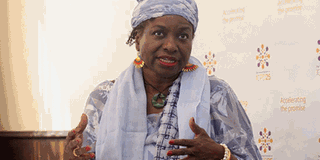UNFPA boss’ appeal on women's health

UNFPA Executive Director, Dr Natalia Kanem during a past media briefing in Nairobi, last year. She wants nations affected with Covid-19 to ensure women's sexual and reproductive health needs are met. PHOTO | KANYIRI WAHITO | NATION MEDIA GROUP
United Nations Population Fund (UNFPA) Executive Director Natalia Kanem has called on nations affected with Covid-19 to ensure women and girls' sexual and reproductive health needs are met.
The UN agency whose interventions mainly focus on safeguarding the sexual and reproductive health and rights (SRHR) of women and girls across the globe, is already seeking for $67.5 million. This is to respond to the related needs for the next two months as countries' shift focus to containing coronavirus.
"We need to ensure that the most intimate needs of the world's women and girls are met while we battle Covid-19," said Dr Kanem in a March 30 message on UNFPA's Twitter account.
The entity indicates the pandemic has negatively impacted provision of SRH services thus, the need for intervention to eliminate risks associated with inaccessibility to such services.
Gender-based violence
"Unprecedented consequences of this pandemic and the restrictive measures imposed by most countries have negatively impacted access to lifesaving sexual and reproductive health services and response to gender-based violence in times where women and girls need these services most" notes UNFPA in its Global Response Appeal available on its website.
With US$67.5 million funding, UNFPA would prioritise supporting countries with weak public health and social support systems.
The financial boost would enable the countries effectively avail gender-based violence (GBV) and SRH services, especially for pregnant women, young people and the vulnerable impacted by the pandemic.
It would also support risk communication and community engagement strategies involving dissemination of risk reduction messages, and effecting related actions which would respond to needs of quarantined women and girls.
In addition to facilitating countries, it will provide GBV prevention and response services including GBV survivor services such as temporary shelter, safe housing, and financial support.





